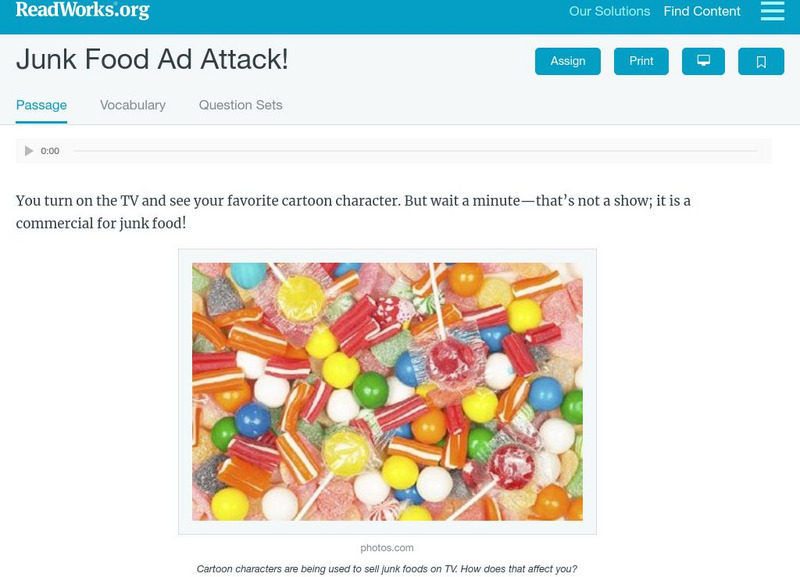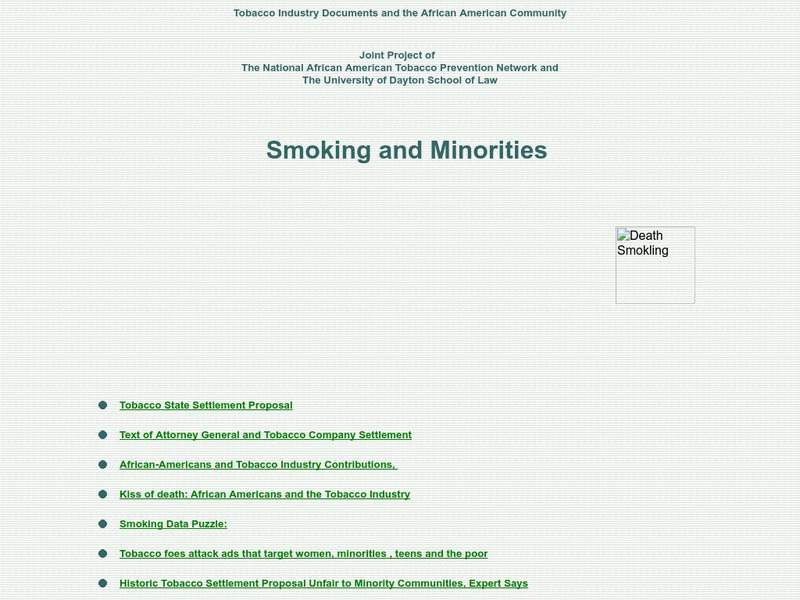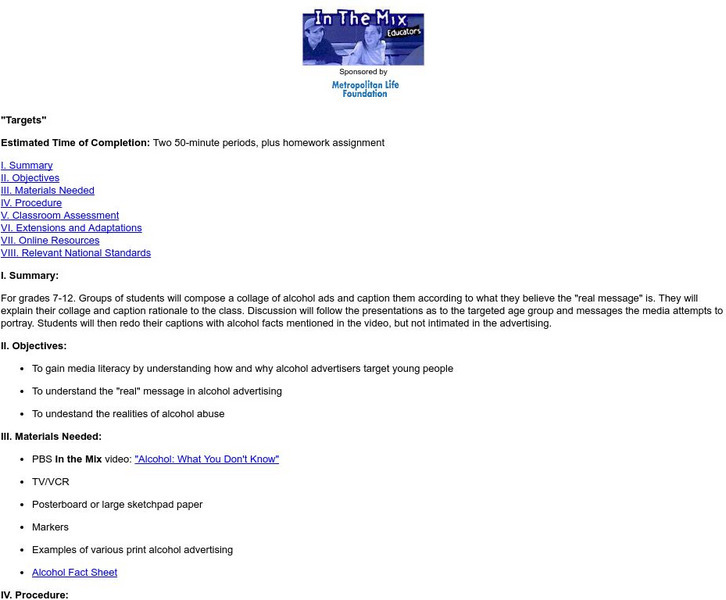Curated OER
Petroleum Poisons
Learners discover how harmful petroleum distillates are that are found in the home. They demonstrate how to collect information about consumer products. They also ask their parents about the safety of the cleaning supplies used in their...
Curated OER
Pesticide Prevalence
Students investigate the prevalence of pesticides in their communities by
searching their homes, visiting local stores and talking to extended family and friends. They conduct their search by classifying pesticides based on the pests...
Curated OER
Who Participates? Identifying Diversity
Students listen to sound bite of producer/director Nick Giannopoulos, and discuss issue of stereotypical portrayals of cultural groups presented in the media. Students then use questionnaires and view popular television shows to observe...
Curated OER
Alphabet Letters A-Z and Alphabet Numbers 0-9
In this alphabet and numbers worksheet, students cut out and place in sequential order the uppercase and lowercase letters and numbers a-z and 1-10.
Curated OER
Stress in English
In this stress in English worksheet, students mark the stressed syllables in a set of words after reading a brief paragraph of information about how to proceed.
Other
Annenberg Classroom: Flack check.org
FlackCheck.org is the political literacy companion site to the award-winning FactCheck.org. We provide resources to help students recognize flaws in arguments in general and political ads in particular. Explore politics, science and health.
Federal Trade Commission
Federal Trade Commission: Consumer Information: Health and Fitness
Learn how to decode ads for products that promise to cure everything from baldness and cancer to diabetes and dementia, and for services that say they will shape you up, restore your youthful glow, and turn those abs into a well-defined...
Annenberg Foundation
Annenberg Learner: Middle Ages: Health
Discussion and explanation of health during the Middle Ages with special focus on treatment, patients, surgery, myths and superstitions.
Read Works
Read Works: Junk Food Ad Attack!
[Free Registration/Login Required] An informational text about companies marketing junk food to children. A question sheet is available to help students build skills in reading comprehension.
Alabama Learning Exchange
Alex: New Town Health Club
Over the course of the year, the students in Human Anatomy and Physiology will design a health club. As part of this year-long project, the students will develop a brochure or print advertisement for the health club. This project will...
Curated OER
Kids Health: A Guide to Eating for Sports
Television ads and magazines are littered with new sports drinks and supplements that claim to enhance performance for athletes. Are these claims proven to be true or just cunning marketing schemes? This article delves into the hype and...
Other
Museum of Health Care: Reading the Trade Cards
Trading cards were popular in the 1800s and 1900s as a way of advertising health and beauty products. This exhibit shows examples of various types and discusses the advertising techniques used. Younger children will especially enjoy the...
AdLit
Ad lit.org: Understanding the School Counselor Parent Connection
School counselors work with teachers, administrators, and parents to help students with schoolwork and their social/emotional development.
University of Michigan
University of Michigan Health System: What Are Learning Disabilities (Ld)?
The University of Michigan has and extremely thorough article posted on this site offering comprehensive information on learning disabilities. Measures that parents can take are also available on this site.
Mental Health America
Mental Health America: Mental Health Info: Adhd and Add
Introduction to ADHD and ADD in children covers the signs and symptoms, causes, the impact they have, and how to get help.
AdLit
Ad lit.org: What Works in Comprehension Instruction
The National Reading Panel identified three predominant elements to support the development reading comprehension skills: vocabulary instruction, active reading, and teacher preparation to deliver strategy instruction. L .9-10.3...
McGraw Hill
Glencoe: Recognizing Propaganda: Loaded Language
Lesson plan designed for consumer health class, that is also useful for media literacy. Contains a link to an ad for an abdominal strengthening machine that provides the basis of the lesson. SL.9-10.2 eval & integrate sources
Other
Smoking and Minorities
This web-article addresses the effects of gearing the advertising of tobacco products to minority communities. Examines the 1997 tobacco settlement. Author uses statistics to support his/her argument.
PBS
Pbs Teachers: Just Desserts
Identify advertising techniques designed to encourage children to overindulge in unhealthy foods. Explore the motives behind advertising and use your knowledge to think critically about ads all around you. Scroll down to "Just Desserts,"...
PBS
Pbs: In the Mix Educators: Alcohol "Targets" Lesson Plan
Here is a simple guideline for a two-period lesson through which students "Compose a collage of alcohol ads," and participate in activities that will help hone their critical thinking skills and their views about alcohol and alcohol...
TED Talks
Ted: Ted Ed: How to Spot a Fad Diet
Conventional wisdom about diets, including government health recommendations, seems to change all the time. And yet ads routinely come out claiming to have THE answer about what we should eat. So how do we distinguish what's actually...
Read Works
Read Works: Burger Battles
[Free Registration/Login Required] An informational text about fast food, health risks caused by eating fast food, and increased fast food marking to young people. A question sheet is available to help students build skills in reading...
PBS
Pbs: Scientific American Frontiers: Teaching Gude: Healthy Choices
Through this activity, high school students keep track of what they eat everyday and compare their nutrient intake with the minimum requirements for good health.
Other
Story md.com: Early Onset Alzheimer's Disease
Early-onset Alzheimer's disease is a form of Alzheimer disease (AD) that develops before the age of 65. This form represents less than 10 percent of all people with Alzheimer's. This article discusses risk factors, genetics, diagnosis,...























